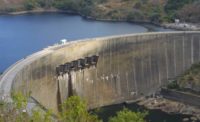Take a Tour of the World's Megaprojects | Dubailand | International Space Station | Jubail II Industrial Complex | Great Man-Made River Project | Saadiyat Island Entertai
In the 1970s, Saudi Arabia’s leaders decided to move away from a singular focus on oil and gas extraction to broaden their country’s economy. With the Bechtel Group as their adviser and program manager, they planned and built a massive industrial complex in Jubail, a former fishing village on the Persian Gulf.



The build-out of petrochemical plants, fertilizer plants, steel mills and other industries continued for three decades. The construction workforce peaked at 40,000 in the 1980s. Today, Jubail, a city of 150,000 residents, is Saudi Arabia’s industrial heart, accounting for 7% of the country’s GDP.
In 2002 the Royal Commission for Jubail and Yanbu, the government entity guiding the complex’s development, embarked on a 8,300-hectare expansion, known as Jubail II. The project, under Bechtel’s management, is being carried out in four stages. In total, it will add new primary industries comprising as many as 100 plants, expand the King Fahad Industrial Port and develop residential districts for an additional 150,000 people.
In the industrtial areas alone, Jubail II involves 40 million to 45 million cu m of earthmoving, of which 85% is complete. The residential zone requires 60 million to 65 million cu m of earthmoving. The current construction workforce is 14,500 and is expected to remain at that level for the next few years.
Completed elements of the first phase include a 3.8-kilometer highway linking Jubail II to the existing city, an 80-hectare quay at the port and five new tanker berths. Five hose towers, for loading petrochemical products into tankers, will be finished in early 2011. Construction will commence next year on a 60-km-long rail link between the industrial zone and the port.
Construction is currently under way on a separate rail link connecting the mineral-rich north with Ras Al Zawr minerals city, 85 km north of Jubail; the link should be finished by the end of 2010. The plan is then to build a rail link connecting Ras Al Zawr to Jubail, thus providing access from the north to Jubail’s port facilities.
Plans also are in the works for a 1,065-km-long, east-west rail line linking Jubail with Jeddah via Dammam and Riyadh. The line would form a “land bridge” across the Arabian Peninsula, further elevating Jubail’s strategic importance.
Suez Energy International and Acwa Power Projects are building a $3.4-billion independent desalination and powerplant. The desalination facility will include 27 units employing multiple-effect distillation technology and provide 800,000 cu m per day of desalinated water. The 2,745-MW powerplant will employ combined-cycle gas turbines.
The largest single component planned so far for Jubail II is a new refinery supplied with heavy crude from the Moneefa oil field and capable of producing 400,000 barrels per day. The refinery owner is Satorp, a joint venture consisting of Saudi Aramco and France’s Total, each holding a 37.5% share, with the remaining 25% sold to Saudi individuals. The construction cost is estimated at $9.6 billion, split into 15 contracts. France’s Technip is responsible for the front-end engineering design and managing the engineering, procurement and construction phases. Spain’s Tecnicas Reunidas won a $1-billion contract to build crude and hydro-treating units. Construction began this year, and the refinery is slated to begin production in late 2013. It is expected that once the refinery is complete, new industrial tenants will decide to build plants at Jubail II to take advantage of the available petrochemical feedstock.
Development is under way on three large residential districts—Jalmudah, Mutrafiah and Mardoumah—each of them spanning 10 sq km and accommodating 50,000 residents. Construction of Jalmudah and Mutrafiah has begun. Primary and secondary site development has been finished on 25% of Jalmudah, and construction of housing has started there. Jalmudah is expected to be built out by 2016 and Mutrafiah by 2018. When all three districts are complete, the population of Jubail will have doubled.
Location: Saudi Arabia
Estimated Cost: $80 billion
Construction Period: 2002-2024
Developer: Royal Commission for Jubail and Yanbu
Click below on each box to view more about the project







